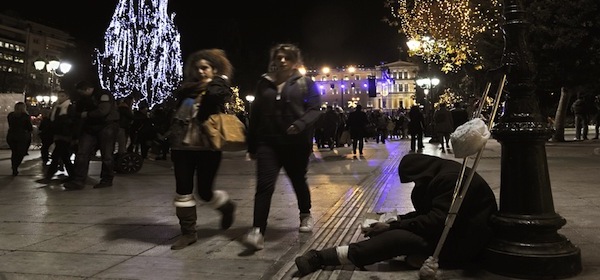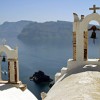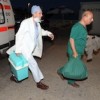With Greeks limping to the end of a fifth year of recession and readying for another, along with more pay cuts, tax hikes and slashed pensions, many are foregoing Christmas celebrations or planning family gatherings with everyone chipping in for food.
Athens has cut its Christmas budget by 90 percent – there is no tree in the city’s center of Syntagma Square as traditional – and an annual Christmas village there is missing this year. In neighborhoods around the city, as in other cities and towns across Greece, there are few Christmas lights being put up by municipalities or on private homes. There seems to be little Christmas spirit in the age of austerity.
The Syntagma tree was burned down by protesters in 2010, the first year of austerity measures that were imposed as Greece went hand-in-hand to international lenders to beg for help to keep the economy from collapsing.
Last year, Athens officials, perhaps hoping to show some spirit and deflect the suffering of many, erected Europe’s biggest Christmas tree on the spot which this year has been replaced by some kind of art display.
“This year’s Christmas events do not aim at an easy and ornate spectacle and they are not based on thoughtless waste,” Athens Mayor George Kaminis said, according to the British newspaper The Guardian. Kaminis said the city couldn’t afford to do more and that while “young and old alike” would be entertained with music, theatre, dance, carols and clowns, it would be a muted merry-making.
The Guardian noted that with Athens barely able to pay its bills, only three central squares and the city’s biggest boulevards are to be illuminated, in stark contrast to years gone by when there was money to spend. “Our goal this year,” said City Councillor Vasilliki Georgiou, “is to spread the real meaning of Christmas – solidarity, love and fraternity.”
In the spirit of the, Syntagma Square, the gathering place for more than 2 ½ years of protests, strikes and riots against austerity, has 16 miniature trees carved by fine arts students in Athens. There’s also an ice rink sponsored by the mobile telephone company Wind, but with the weather relatively mild there’s difficulty in keeping it frozen.
“There’s also going to be a light show so the tree will look very different at night,” a municipal employee overseeing last-minute preparations ahead of the unveiling told the newspaper.“And there’ll be music too,” she said as trumpeters and saxophonists with the town hall’s orchestra got into the mood with a jazzy rendition of Christmas carols.
In the western port city of Patras, there’s also a damped-down Christmas as officials insteade turn trying to help people who are struggling. “Last year we fed 800 families living below the poverty line,” Theoharis Massaras, who as deputy mayor directs the municipality’s social services, told The Guardian.
Times are so tough that Thessaloniki’s Mayor Yiannis Boutaris, a wine company owner, said he can’t afford the oil to heat his apartment and is using a blanket instead.
The Athens News Agency noted that many Greeks will have a “Refene” Christmas, a Turkish word meaning that expenses will be shared by family members. Unemployment is at a record 26 percent, some 68,000 businesses have closed and thousands more are expected to close because more strikes are keeping shoppers – those few with money – from getting around or into the city’s center.
Beggars abound, as do the homeless, with growing numbers including people who used to have professions but now have park benches and cardboard boxes as residences in the chilly nights. Storefronts have been empty for so long the grime has covered what’s left of the detritus inside.
ANA reported that there’s sparse crowds at the annual annual Christmas Bazaar in the National Gardens adjacent to the Parliament, where lawmakers have been the target of protests and where the government has exempted workers there from more pay and benefit cuts.
Nobody is buying children’s books, or artisanal pieces or komboloi, the traditional secular rosaries which Greeks hold in their hands to chase away bad thoughts. The same scene can be seen in the tourism district of Plaka: the souvenirs are all there and few tourists walk by without buying anything, ANA reported. It could be remembered as the year Greece didn’t celebrate Christmas.
Source: Greek Reporter


















